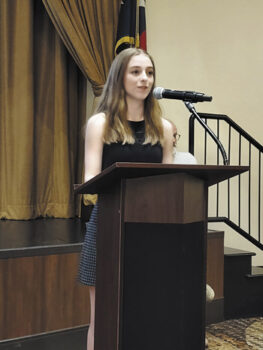
Essay winner Ashton Watts gives an excellent speech.
Lewis Toland
The digital age has transformed most teens into “screenagers” who are ill-acquainted with American history, much less civics. When an individual’s memory fails, his identity begins to vanish, so bewilderment sets in. This principle holds for nations as well, so the question becomes: Can concepts bind the generations?
In the face of educational fads, such as CRT, DEI, and the 1619 Project, the Robson Ranch Republican Club challenged area high school students to demonstrate their command of U.S. history, politics, ethics, and rhetoric. The club offered prizes of $500, $300, and $200 to the most convincing essayists responding to conflicting assertions made by Abraham Lincoln and Dr. Martin Luther King, Jr.
In 1838 young Abraham Lincoln spoke to the Springfield Lyceum against political violence after the lynching of abolitionist editor Elijah Lovejoy and the tossing of his printing press into the Mississippi River. Lincoln cited respect for our Founders’ character as the basis for obeying laws that we dislike. In contrast, Dr. King’s “Letter from Birmingham Jail” advocated a contrary view: We should disobey an unjust law. Students were asked to write a 750-word essay preferring the philosophy of one of these two men over the other and to persuade the reader to that position—the goal of rhetoric.
Eight contestants entered the competition. Ashton Watts, a junior at Founders Classical Academy in Lewisville, argued most persuasively in favor of Lincoln’s position. The three judges independently recognized “Law-abiding Citizens: Lincoln and King on Unjust Laws” as clearly the best-crafted argument.
Miss Watts closed her essay, “Men do not create laws. They do but discover them. Let us hope that Americans refuse to create the unjust and resolve to discover the just. Let us hope that we continue down the path that these great men set before us.”
Ashton read her essay to the RR Republican Club at the regular meeting on May 3. Members complimented her confident, courteous performance, which confirmed British statesman Edmund Burke’s conception of conservatism: “a partnership not only between those who are living, but between those who are living, those who are dead, and those who are to be born.” Her speech demonstrated, thankfully, that vital ideas do pass from one generation to its successors.
The second-place winner is a senior at Coram Deo Academy in Flower Mound, and the third-place winner attends Liberty Christian in Argyle. Even though most students ignore history and avoid the discipline of drafting and revising essays to benefit an imagined audience rather than to express themselves, a faithful remnant of young scholars loves our nation and submits to the discipline essential to good citizenship.
Barbara Leurig and Judy Martin-Tafoya graciously served as judges, and Lewis Toland directed the contest. The Republican Club generously donated the prizes for what will be an annual event.
